北师大高中英语选修八GlobalWarming
- 格式:pptx
- 大小:2.34 MB
- 文档页数:29
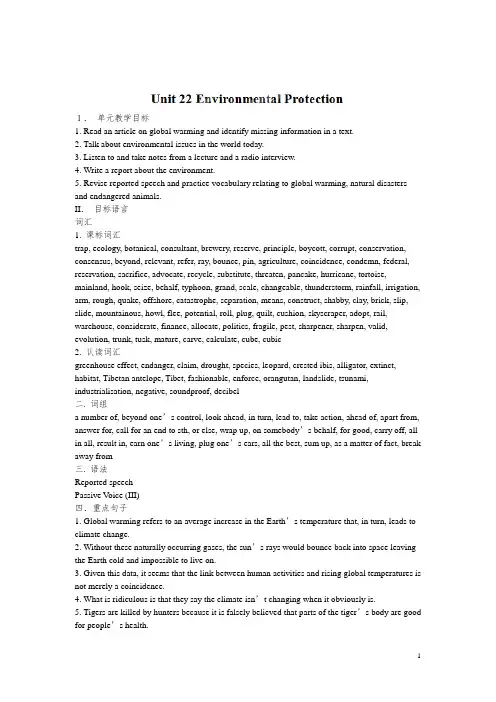
I.单元教学目标1. Read an article on global warming and identify missing information in a text.2. Talk about environmental issues in the world today.3. Listen to and take notes from a lecture and a radio interview.4. Write a report about the environment.5. Revise reported speech and practice vocabulary relating to global warming, natural disasters and endangered animals.II.目标语言词汇1. 课标词汇trap, ecology, botanical, consultant, brewery, reserve, principle, boycott, corrupt, conservation, consensus, beyond, relevant, refer, ray, bounce, pin, agriculture, coincidence, condemn, federal, reservation, sacrifice, advocate, recycle, substitute, threaten, pancake, hurricane, tortoise, mainland, hook, seize, behalf, typhoon, grand, scale, changeable, thunderstorm, rainfall, irrigation, arm, rough, quake, offshore, catastrophe, separation, means, construct, shabby, clay, brick, slip, slide, mountainous, howl, flee, potential, roll, plug, quilt, cushion, skyscraper, adopt, rail, warehouse, considerate, finance, allocate, politics, fragile, pest, sharpener, sharpen, valid, evolution, trunk, tusk, mature, carve, calculate, cube, cubic2. 认读词汇greenhouse effect, endanger, claim, drought, species, leopard, crested ibis, alligator, extinct, habitat, Tibetan antelope, Tibet, fashionable, enforce, orangutan, landslide, tsunami, industrialisation, negative, soundproof, decibel二. 词组a number of, beyond one’s control, look ahead, in turn, lead to, take action, ahead of, apart from, answer for, call for an end to sth, or else, wrap up, on somebody’s behalf, for good, carry off, all in all, result in, earn one’s living, plug one’s ears, all the best, sum up, as a matter of fact, break away from三. 语法Reported speechPassive V oice (III)四.重点句子1. Global warming refers to an average increase in the Earth’s temperature that, in turn, leads to climate change.2. Without these naturally occurring gases, the sun’s rays would bounce back into space leaving the Earth cold and impossible to live on.3. Given this data, it seems that the link between human activities and rising global temperatures is not merely a coincidence.4. What is ridiculous is that they say the climate isn’t changing when it obviously is.5. Tigers are killed by hunters because it is falsely believed that parts of the tiger’s body are good for people’s health.6.There are thousands of endangered species in the world and if the rate at which species are becoming extinct continues to rise, then millions of species will become extinct in the next decade.7. Nature is turning on us!8. The last few years have seen environmental disasters on a grand scale, and experts are predicting far worse to come.9. This catastrophe is still very fresh in the minds of people worldwide who have not yet get over their separation from loved ones lost in the tsunami.10.Most disaster experts believe there is the potential that things could get a lot worse.11.In the last few decades, scientists have reached consensus and reported that human beings are causing changes in the Earth’s climate —something previously seen as beyond our control. 12.A number of nations have already been in armed conflict over water, and reduced rainfall in the west of the US has resulted in huge forest fires.五.交际用语1. Justifying Arguments...so that...That’s why...I mean, basically...And I think, because of that....That’s the reason why...One reason they are poor is...2. Giving opinionsWhat I don’t understand is...What’s really worrying ...I’m not sure. I haven’t thought about it much.What’s ridiculous is...That’s a good question.What we should do is...III.教材分析与教材重组本单元以环保为话题,介绍了人类与环境、动物与环境的关系。
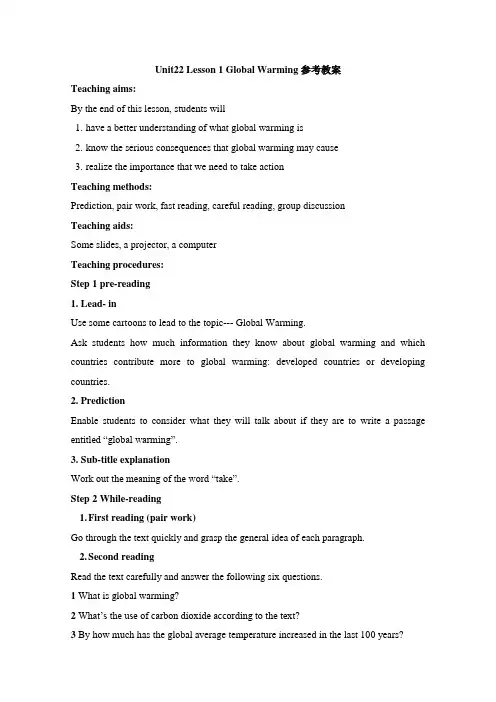
Unit22 Lesson 1 Global Warming参考教案Teaching aims:By the end of this lesson, students will1.have a better understanding of what global warming is2.know the serious consequences that global warming may cause3.realize the importance that we need to take actionTeaching methods:Prediction, pair work, fast reading, careful reading, group discussionTeaching aids:Some slides, a projector, a computerTeaching procedures:Step 1 pre-reading1. Lead- inUse some cartoons to lead to the topic--- Global Warming.Ask students how much information they know about global warming and which countries contribute more to global warming: developed countries or developing countries.2. PredictionEnable students to consider what they will talk about if they are to write a passage entitled “global warming”.3. Sub-title explanationWork out the meaning of the word “take”.Step 2 While-reading1.First reading (pair work)Go through the text quickly and grasp the general idea of each paragraph.2.Second readingRead the text carefully and answer the following six questions.1 What is global warming?2What’s the use of carbon dioxide according to the text?3 By how much has the global average temperature increased in the last 100 years?4 What human activities are causing global warming?5 What consequences will global warming cause?6 How can each of us help solve the problem of global warming?Step 3 Post-reading1. Listening (Listen to strengthen understanding)2. Blanks filling. Students are asked to fill in the blanks with some key words to retell the text. Step 4 Group discussionWhat’s your attitude towards plastic bags banning?What can we use without these free plastic bags?Step5 SummaryWhat do we learn from today’s lesson?What will we do to protect our environment in our daily life?Step 6 Homework1.Finish Exercise 5 on page 72.Preview Grammar--- Reporting。
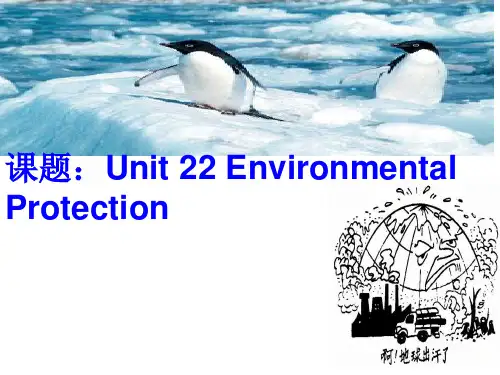
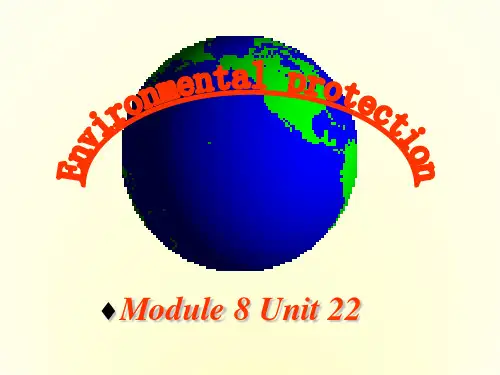
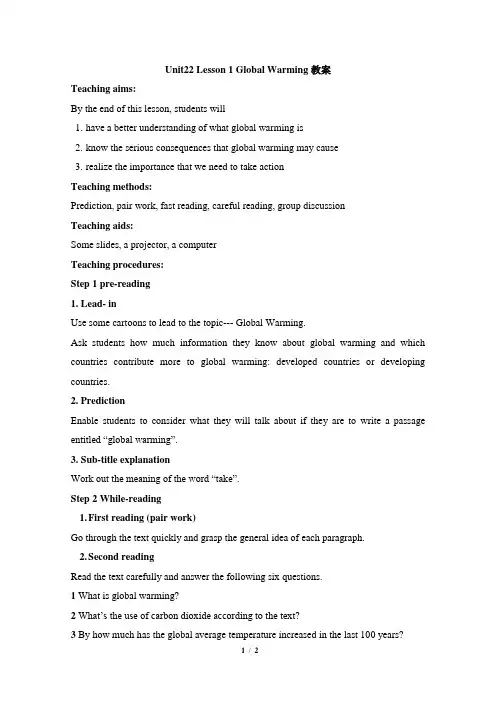
Unit22 Lesson 1 Global Warming教案Teaching aims:By the end of this lesson, students will1.have a better understanding of what global warming is2.know the serious consequences that global warming may cause3.realize the importance that we need to take actionTeaching methods:Prediction, pair work, fast reading, careful reading, group discussionTeaching aids:Some slides, a projector, a computerTeaching procedures:Step 1 pre-reading1. Lead- inUse some cartoons to lead to the topic--- Global Warming.Ask students how much information they know about global warming and which countries contribute more to global warming: developed countries or developing countries.2. PredictionEnable students to consider what they will talk about if they are to write a passage entitled “global warming”.3. Sub-title explanationWork out the meaning of the word “take”.Step 2 While-reading1.First reading (pair work)Go through the text quickly and grasp the general idea of each paragraph.2.Second readingRead the text carefully and answer the following six questions.1 What is global warming?2What’s the use of carbon dioxide according to the text?3 By how much has the global average temperature increased in the last 100 years?4 What human activities are causing global warming?5 What consequences will global warming cause?6 How can each of us help solve the problem of global warming?Step 3 Post-reading1. Listening (Listen to strengthen understanding)2. Blanks filling. Students are asked to fill in the blanks with some key words to retell the text. Step 4 Group discussionWhat’s your attitude towards plastic bags banning?What can we use without these free plastic bags?Step5 SummaryWhat do we learn from today’s lesson?What will we do to protect our environment in our daily life?Step 6 Homework1.Finish Exercise 5 on page 72.Preview Grammar--- Reporting。
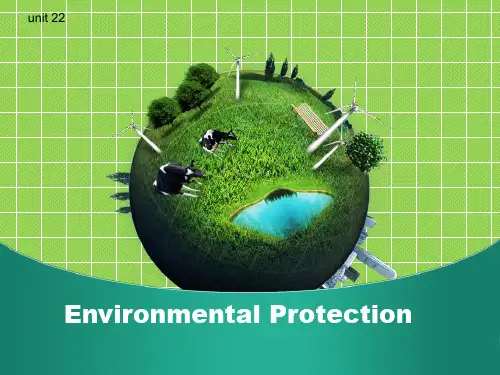
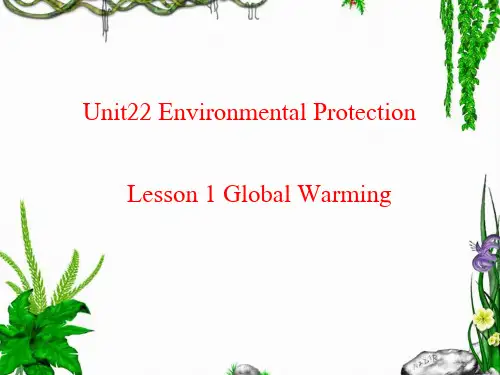

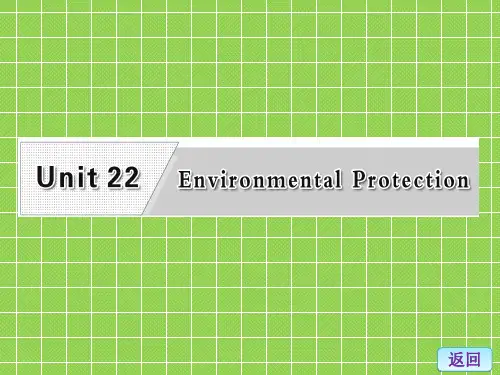
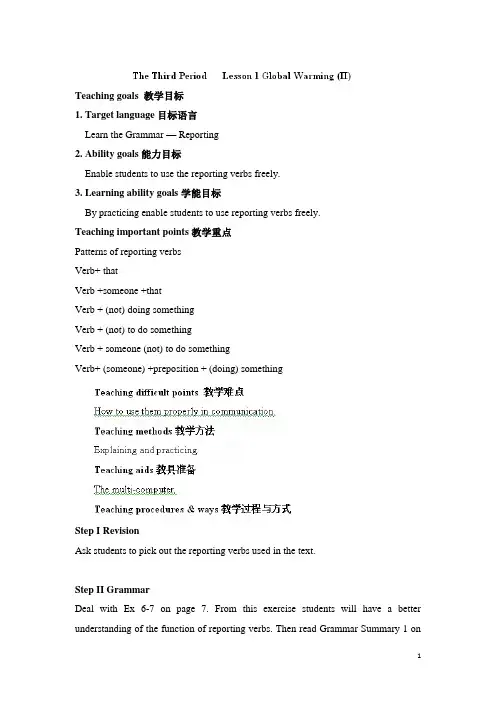
Teaching goals 教学目标1. Target language目标语言Learn the Grammar — Reporting2. Ability goals能力目标Enable students to use the reporting verbs freely.3. Learning ability goals学能目标By practicing enable students to use reporting verbs freely.Teaching important points教学重点Patterns of reporting verbsVerb+ thatVerb +someone +thatVerb + (not) doing somethingVerb + (not) to do somethingVerb + someone (not) to do somethingVerb+ (someone) +preposition + (doing) somethingStep I RevisionAsk students to pick out the reporting verbs used in the text.Step II GrammarDeal with Ex 6-7 on page 7. From this exercise students will have a better understanding of the function of reporting verbs. Then read Grammar Summary 1 onpage 100. After reading Grammar Summary 1, continue to do the rest of grammar exercises.T: In Grammar definitions, you will find a summary of basic reported speech. This most commonly involves using the verbs say, tell and ask, as well as changes of verb tenses, times, places and pronouns: (Show the following on the PowerPoint.)"I am going to the shop."He said (that) he was going to the shop."Sit down and open your books."She told us to sit down and open our books."Will you come with us tomorrow?"He asked me if I would go with them the following day.A native speaker of English, however, will often use reporting verbs other than just say, tell and ask. Compare the following:"I didn't do it!"He said that he hadn't done it.He denied that he had done it OR He denied doing it."I'll bring the book back tomorrow."She said that she would bring the book back the following day.She promised to bring the book back the following day."Please will you think about it some more?"He asked me if I would think about it some more.He begged me to think about it some more."First you should put the money in the slot and then you should press the button."She said that I should first put the money in the slot and then press the button.She explained what I should do.Notice that different reporting verbs are followed by different structures, i.e.deny + that-clause ORdeny + -ing formpromise + infinitivebeg + object + infinitiveSUMMARY OF REPORTING VERBSNote that some reporting verbs may appear in more than one of the following groups.1. Verbs followed by 'if'or 'whether' + clause:ask know remember say see2. Verbs followed by a that-clause:add admit agree announce answer argue boast claim comment complain confirm consider deny doubtestimateexplainfearfeelinsistmentionobservepersuadeproposeremarkrememberrepeatreplyreportrevealsaystatesuggestsupposetellthinkunderstandwarn3. Verbs followed by either a that-clause or a to-infinitive:decide expect guarantee hope promise swear threaten4. Verbs followed by a that-clause containing should(but note that it may be omitted, leaving a subject + zero-infinitive):advise beg demand insistpreferproposerecommendrequestsuggest5. Verbs followed by a clause starting with a question word:decide describe discover discuss explain forget guess imagineknowlearnrealiserememberrevealsayseesuggestteachtellthinkunderstandwonder6. Verbs followed by object + to-infinitiveadvise askbeg command forbid instruct inviteteachtellwarnStep III PracticeDeal with grammar Ex 8-10 on Page 7. Students should do the exercises individually first, then check the answers with the whole class. Deal with the grammar Ex 1-3 on Page 52 and Ex 6 on Page 53 in the same way.Examples:Jack encouraged me to look for a new job.They invited all their friends to attend the presentation.She offered to give him a lift to work.My brother refused to take no for an answer.Tom admitted (that) he had tried to leave early.She agreed (that) we needed to reconsider our plans.He denied having anything to do with her.Ken suggested studying early in the morning.Ken suggested that we (should) study early in the morning.Mr. Smith advised to set off early.Mr. Smith advised us setting off early.Mr. Smith advised that we should set off early.They accused the boys of cheating on the exam.She blamed her husband for missing the train. He apologized for being late.She insisted on doing the washing up.He apologized for being late.She insisted on doing the washing up.Step V Homework1. Go over the grammar in Unit 22.2. Finish Ex 4-5 on Page 53.。
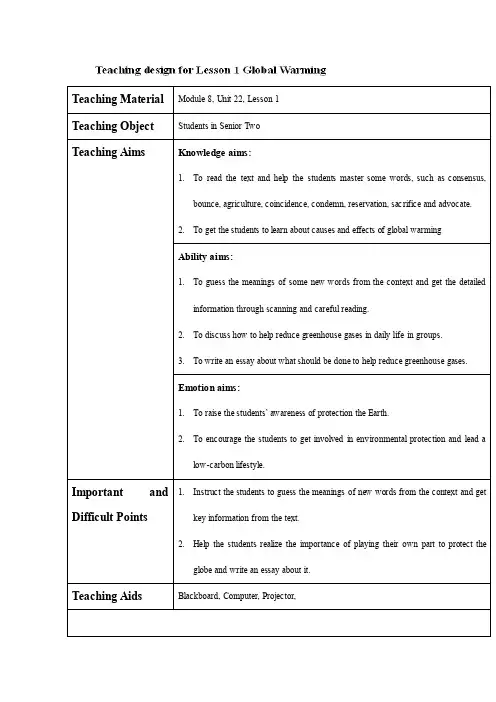
Teaching Material Module 8, Unit 22, Lesson 1Teaching Object Students in Senior TwoTeaching Aims Knowledge aims:1.To read the text and help the students master some words, such as consensus,bounce, agriculture, coincidence, condemn, reservation, sacrifice and advocate.2.To get the students to learn about causes and effects of global warmingAbility aims:1.To guess the meanings of some new words from the context and get the detailedinformation through scanning and careful reading.2.To discuss how to help reduce greenhouse gases in daily life in groups.3.To write an essay about what should be done to help reduce greenhouse gases.Emotion aims:1.To raise the students’ awareness of protection the Earth.2.To encourage the students to get involved in environmental protection and lead alow-carbon lifestyle.Important and Difficult Points 1.Instruct the students to guess the meanings of new words from the context and getkey information from the text.2.Help the students realize the importance of playing their own part to protect theglobe and write an essay about it.Teaching Aids Blackboard, Computer, Projector,Teaching ProceduresTeacher’s Activities Students’ Activities Purposes StepⅠW arm-upGet the students to watch a video clip about a public ad of global warming. Watch the video clip and figure outthe topic of this period.To lead in the topic andarouse their interest.StepⅡPre-reading1. Get the students to talk about which countries contribute more to global warming and explain the reasons.2. Elicit answers from the students. Talk about the question and try tothink about the reasons for theanswer.To prepare for the followingintensive reading.StepⅢWhile-reading T ask One: Scanning1. Get the students to scan the text for some new words.2. Have the students work in pairs and work out their meanings from the context.3. Check the student s’ answers.4. Help the students to analyse the organization of the text. 1. Scan the text for the sentences wherethe words are.2. Work in pairs, working out themeanings from the context.3. Divide the text into three parts.1. To cultivate the students’ability to guess new words.2. To help the students findout the organization of thetext.T ask T wo: Careful Reading1. Guide the students to read Part one carefully and try to find out the main purpose of the first paragraph.2. Guide the students to read Part two carefully and try to find out the answers to the 6 questions.3. Guide the students to read Part three carefully and try to find out the answers to the 2 questions. 1. Read Part one carefully and find outthe main purpose of it.2. Read Part two carefully and find outthe answers according to the 3paragraphs.3. Read Part three carefully and find outthe answers to the following questions.1. To get the students to havea better and furtherunderstanding of the text.2. To cultivate the students’ability to get detailed andkey information throughintensive reading.Task Three: Task-based Reading1. Present the chart and ask the students to find the answers from the text.2. Get the students to check answers in pairs first and then as a class. 1. Look for suitable words from the textaccording to the chart.2. Check answers in pairs by swappinglearning sheets first and then reportanswers actively.1. To consolidate the students’comprehension of the text.2. To help the students storemore vocabulary.StepⅣPost-reading1. Guide the students to think about what they will do to help reduce greenhouse gases, working in groups.2. Call on the students to take part in environmental protection. 1. Work in groups, talking about whatthey will do to help reduce greenhouseeffects.2. Realize the importance of protectingour globe.1. To enforce what thestudents have learnt andencourage cooperation.2. To adovate leading alow-carbon lifestyle.StepⅤHomework1. Read the text fluently and recite Para.2.2. Write an essay about what you will do to live a low-carbon lifestyle.(适应于A层)Step ⅥDesign on the BbStep ⅥRecord after teaching。
教学设计思路第一课时Warm up & Reading:Can we take the heat?教学目标1. 学生能够借助图片总结出课文各自然段主题。
2. 能够通过阅读掌握课文的细节内容3. 能够通过学习增强环境意识和对地球的保护意识教学内容阅读关注:找出文章结构及细节阅读。
相关词汇:poverty ecology conservation vehicles相关短语:natural disaster the greenhouse effect endangered animals forest destruction nature reserves说明本课难点:①课文内容中的概念对学生来说不易完全理解,需要增加一些背景信息。
②词汇较难较大;③需要落实的短语较多;因此第一课可以用三课时完成。
教学步骤Part One: Warm-up时间课堂安排目的活动方式3m Brainstorming: what areEnvironmental problems?(PPt No.3)进入单元话题,打开思路,。
集体参与2 m Complete the sentences with thekey words(教材P5-Ex1) (PPt No.4,5)让学生对相关词汇进行回顾,引导学生对词汇地关注和巩固。
个人练习小组核对6 m Listen to a news report and decidewhether the statements are true offalse.(教材P5-Ex2) (PPt No.6)让学生熟悉本单元的核心话题:人与自然的关系。
集体参与Part Two : Pre-reading5 m Discussion• What is global warming?• Can we take the heat?(PPt No.8-10)让学生统一概念,多向思考,为随后的阅读做好铺垫。
英语:22.1《G l o b a l w a r m i n g》教案(北师大版选修8)Unit 22 Environmental ProtectionLesson 1 Global WarmingTeacher:Wang longshui Date:Apr.24,2012Teaching aims:By the end of this lesson, students will1.have a better understanding of what global warming is2.know the serious consequences that global warming may cause3.realize the importance that we need to take actionTeaching methods:Prediction, pair work, fast reading, careful reading, group discussionTeaching aids:Multi-mediaTeaching procedures:Step 1 Revision1. Ask students to say out several kinds of environmental problems.2. Match the Key Words with their Chinese meaningsconsensus bounce agriculture coincidence condemnreservation sacrifice advocateStep 2 pre-reading1. Lead- in Use some pictures to lead to the topic--- Global Warming.Ask students which countries contribute more to global warming: developed countries or developing countries.2. Prediction Based on the title “Can we take the heat”and some pictures, enable students topredict : What is the text about?Step 3 While-reading1.First reading (pair work) Match the headings with the paragraphs.Para 1. Draw readers’ attention to the topic by asking questions.Para 2. What should human beings do.Para 3. What is global warming.Para 4. Consequences of global warming.Para 5. What cause global warming2.Second reading Read the text carefully and answer the following questions.(1)What is global warming?(2) What human activities are causing global warming?(3) By how much has the global average temperature increased in the last 100 years?(4) Are greenhouse gases necessary for life on Earth?(5)How can each of us help solve the problem of global warming?Step4 Post-readingListen and Complete the formStep 5 Group discussionWhat do we learn from today’s lesson?What will we do to protect our environment in our daily life?What will we do every day to help reduce greenhouse gases?We can do:energy-saving light bulbs,recycled paper, low-flow shower head,public transport , switch off…Step 6 SummaryFill in the blanks about the text.Global warming means an aver age increase in the Earth’s temperature which causes climate change in turn. Scientists think it is ______ ______ that cause global warming, especially gases from ________ and vehicles which speed up global warming. They also think global warming is one of the biggest environmental problems in the 21st century.The Earth’s temperature is controlled by __________ _____like carbon dioxide which ___ heat from the sun in the Earth’s atmosphere. Many experts believe global warming is mainly caused by human ________. Over the last 100 years , the global average temperature has increased_______ and if human beings continue to pump __________ gases into the Earth’s atmosphere, the global warming will cause dramatic climate changes like more frequent floods, _________ and Droughts. There are some serious diseases. Sea level will be ______ , floating coastal area , negatively affecting ______ and forestry.So governments all over the world should reduce the ______of greenhouse gases. We individuals should pay ________ to what we are doing, even small changes like ______ public transport, ________, using low-flow ____________, buying energy-efficient ___________ using recycled paper or ___________ lights can have __________ on the future of the Earth .Step 7 Homework1.Finish Exercise 5 on page 72.Preview Grammar--- Reporting。